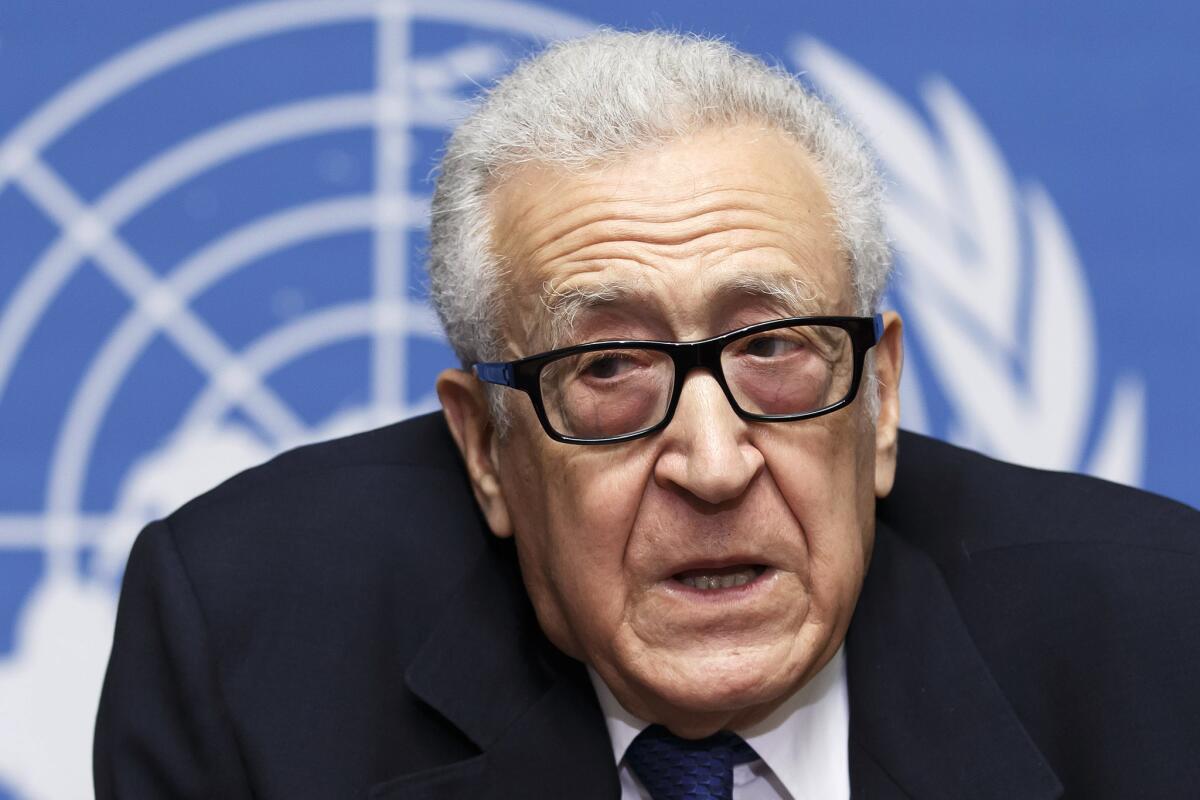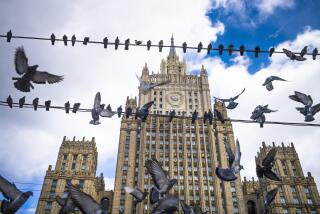Syria peace talks end with no progress; mediator hints at 3rd session

- Share via
BEIRUT — The chief United Nations official at the Syrian peace talks apologized Saturday to the people of the embattled nation after a second round of negotiations ended without any progress toward resolving the almost three-year conflict.
“I am very, very sorry,” Lakdhar Brahimi, U.N. mediator in the talks, told reporters in a downbeat closing note after the session adjourned in Geneva, Switzerland. “I apologize [to] the Syrian people .... But in these two rounds we haven’t helped them very much.”
Many Syrians’ hopes were “very high” that that the talks could have represented “the beginning of the coming out of this horrible crisis,” noted a somber Brahimi, who himself appeared emotionally drained.
Few observers, though, had expected any kind of breakthrough in Geneva to end the fighting, which has left more than 100,000 people dead and created a humanitarian catastrophe.
Brahimi seemed frustrated that the two sides could not even agree on an agenda or a sequencing of items to be discussed. Still, he seemed to signal the likelihood that a third session of talks would be convened, asking each side to reflect on its positions. No date was set.
Neither side in the talks could get by a fundamental point of contention — the future of Syrian President Bashar Assad.
The Syrian government delegation insisted that Assad’s future was not on the table. Negotiators said they didn’t come to Geneva “to hand over the keys to Damascus,” in the words of Faisal Mekdad, Syria’s deputy foreign minister.
On the ground in Syria, the tide of battle has generally turned in the government’s favor, though large swaths of territory remain under opposition control. Syrian forces have made considerable gains on the battlefield in recent months, while fractious rebel groups have spent a lot of time fighting one another. The U.S.-backed opposition delegation in Geneva is an exile-based group with little sway on the ground in Syria.
During the Geneva talks, the opposition bloc focused on the need to form a transitional government without Assad and his top aides.
The Syrian government delegation pushed for initial discussions of “terrorism,” its sweeping description of the armed uprising against Assad’s autocratic rule.
Throughout the two rounds of negotiations, which began last month, each side has seemed to express contempt for the other, despite having had a number of face-to-face meetings. Brahimi, a veteran Algerian diplomat who recently turned 80, was always present as mediator.
On Saturday, Bashar Jaafari, Syria’s chief negotiator in Geneva, dismissed the opposition delegation as “amateurs.” Jaafari, who is also Syria’s U.N. representative, lashed out at the United States and its allies for stepping up military aid to the rebels, as has been reported, even as the peace conference was underway.
“Those people are not really committed toward guaranteeing the success of the Geneva conference,” Jaafari told reporters in Geneva. “On the contrary, there was no goodwill at all.”
Opposition spokesman Louay Safi was equally dismissive of the government and of its chief ally, Russia.
“The regime wants to stall,” Safi told reporters. “There is nothing positive we can take from these two rounds.”
Brahimi was planning to brief the U.N. secretary-general, Ban Ki-moon, in New York, and was also expected to meet with the top U.S. and Russian diplomats, Secretary of State John F. Kerry and Foreign Minister Sergei Lavrov. Washington and Moscow initiated the talks and both nations insist that a political solution is the only way to resolve the onging crisis.
patrick.mcdonnell@latimes.com
More to Read
Sign up for Essential California
The most important California stories and recommendations in your inbox every morning.
You may occasionally receive promotional content from the Los Angeles Times.










